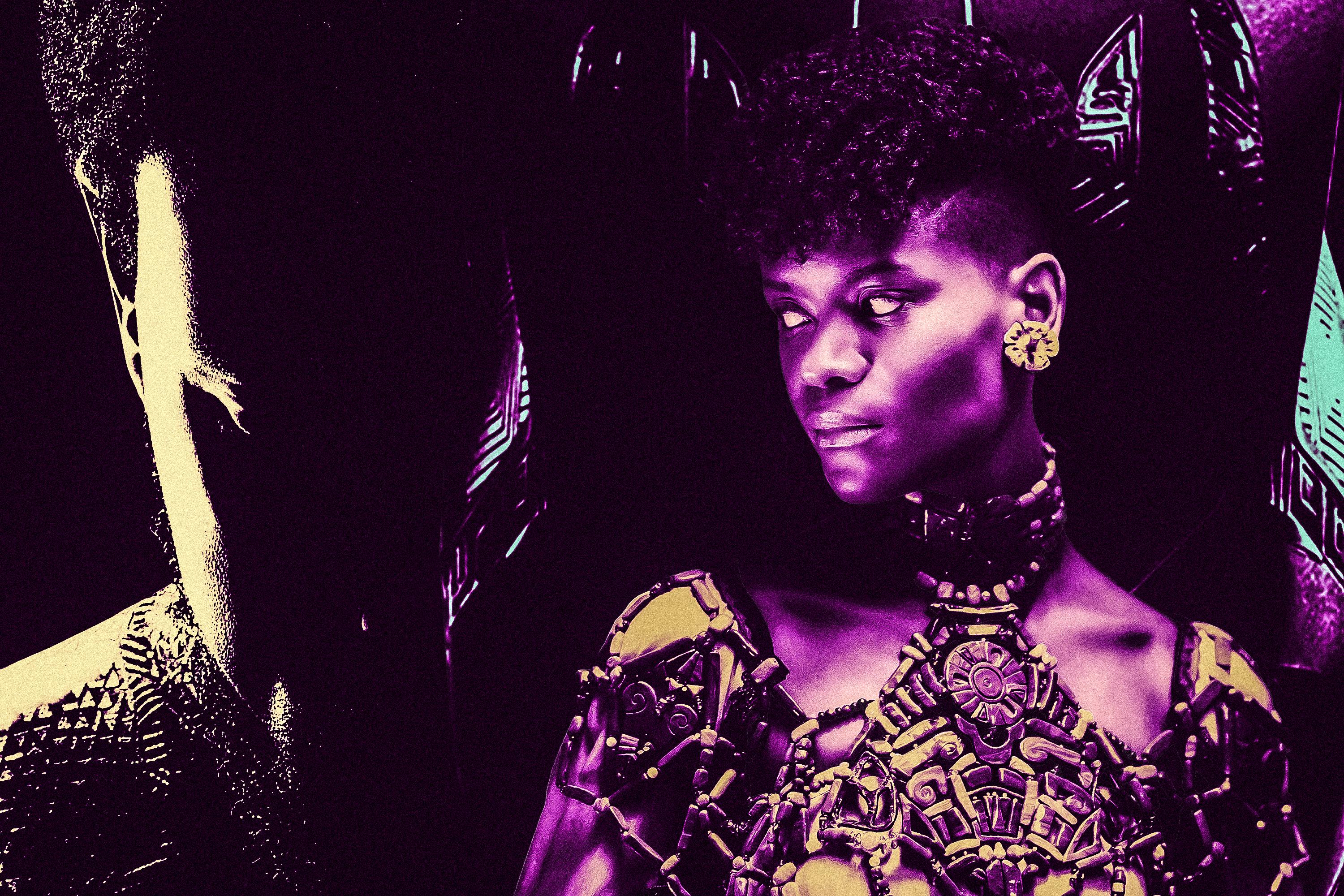

When Shuri (Letitia Wright) is introduced as the younger sister of T’Challa (Chadwick Boseman) in Black Panther, it doesn’t take long for the audience to realize that brilliance runs in the family. While T’Challa is imbued with the sacred powers of the Black Panther—and assumes the responsibilities of being both a superhero and a king to his people with solemn grace—Shuri is a prodigy, whose knowledge of science and skill in the laboratory arguably surpass those of Tony Stark and Bruce Banner. Essentially, if T’Challa was James Bond, then Shuri was his Q: always on hand to create new gadgets or a Black Panther suit for her brother to use in battle. The joy Shuri brought to her work was infectious, and with Wakanda’s ample supply of vibranium at her fingertips, it felt like she could do anything.
Fast-forward to the opening scene of Black Panther: Wakanda Forever, and T’Challa, off-screen, is on the brink of death. While T’Challa’s fate is a foregone conclusion, the result of Boseman’s tragic passing in 2020 from colon cancer, the sequence illustrates Shuri’s belief that science can solve any problem. Even in her brother’s final moments, she desperately tries to engineer a cure for his undisclosed illness. When she’s unable to produce one to save T’Challa, Shuri’s grief is compounded by the feelings of failure—such is the complicated nature of losing those we love far too soon. (To anyone reading who hasn’t seen Wakanda Forever yet, I’d recommend bringing some tissues to the theater.)
T’Challa’s absence looms large throughout Wakanda Forever, most of all as it relates to Shuri. Once a supporting character who skewed toward scene-stealing comic relief—“Don’t scare me like that, colonizer!”—Shuri has been thrust into the spotlight despite wanting to recede from it. (The same could be said of Wright, whose expanded role coincided with the actress expressing controversial anti-vaccine sentiments on social media.) One year after T’Challa’s death, Shuri is toiling away in her lab, only now she’s using her work to shield herself from the rest of the world and avoid reckoning with her grief. Meanwhile, other global powers hope that Wakanda losing its king will weaken it: the United States is practically salivating at the thought of acquiring the country’s exclusive stash of vibranium.
While Wakanda remains strong enough to prevent rival nations on land from stealing its resources, a new adversary emerges from the depths of the ocean. Talokan, a Mesoamerican spin on the Atlantis myth, has its own underwater supply of vibranium. More crucially, Talokan is led by the powerful Namor (Tenoch Huerta Mejía), an aquatic mutant with pointy ears and winged feet who is viewed as a deity by his people. Without access to the heart-shaped herb that gave T’Challa his Black Panther abilities—Erik Killmonger (Michael B. Jordan) had the crops destroyed in the previous film to prevent anyone from opposing his rule—Wakanda is genuinely vulnerable against a nation that levels the technological playing field.
As if that wasn’t enough of a challenge, Shuri and her mother, Ramonda (Angela Bassett), find themselves at odds over how to lead Wakanda moving forward. On the one hand, Ramonda wants to preserve tradition and finds comfort in the spiritual realm—instead of telling Shuri that T’Challa died in the movie’s opening, she says he’s with their ancestors. (Ramonda presides as Wakanda’s ruler after T’Challa’s passing.) Conversely, Shuri continues to embrace modernity with her technology, and believes the Black Panther is a relic from another time: all that mattered was the person she loved behind the suit. It’s an admirable choice from director and cowriter Ryan Coogler to establish this friction between mother and daughter—rather than run away from the complexity of grief, the sequel tackles these feelings head-on.
Because the heart-shaped herb’s extinction has been baked into the plot, the Black Panther sequel spends most of its lengthy running time without anyone taking up the eponymous mantle. Of course, the Wakanda Forever trailers already confirmed that someone would become the new Black Panther, with Shuri being the most obvious candidate. Technically, anyone who ingests the heart-shaped herb can attain the powers of the Black Panther (see: Killmonger), but that doesn’t mean they’re worthy of them. Perhaps the most effective way Wakanda Forever honors T’Challa—and by extension, the revered actor who played him—is by showing how difficult it is to live up to the character’s ideals.
When T’Challa made his MCU debut in Captain America: Civil War, the character was grieving his father, T’Chaka (John Kani), who was killed in an explosion perpetrated by Helmut Zemo (Daniel Brühl). For most of Civil War, T’Challa is fueled by vengeance; ultimately, though, he realizes that killing Zemo is not the same as serving justice, and violence only begets more violence. It’s the first significant step toward T’Challa becoming a noble leader for his people. Another arrives at the end of Black Panther, when he reveals Wakanda to the rest of the world after empathizing with Killmonger’s fury over the kingdom neglecting marginalized communities throughout its existence.
Shuri must go on a similar path of self-discovery in Wakanda Forever with nothing less than the weight of the nation’s future on her shoulders. By crossing paths with Namor, who holds contempt for the surface world because it forced his Mayan ancestors to retreat to the oceans, Shuri is facing her own equivalent to Killmonger: an antagonist whose motivations are understandable, and who represents the temptation to allow anger to dictate your decisions. Namor doesn’t see Wakanda as an enemy, but as a potential ally: two nations powered by vibranium that can make the rest of the world pay for centuries of colonialism. It’s an appealing proposition: As Shuri tells her mother on the one-year anniversary of T’Challa’s death, she’d rather watch everything burn to the ground. Now, Namor is ready to light the fuse.
Because this is the 30th entry of a crowd-pleasing cinematic universe that remains the most reliable moneymaker in Hollywood, it shouldn’t come as a surprise that Shuri doesn’t break bad in Wakanda Forever. But the extent to which the character struggles with grief and lets rage consume her during pivotal moments is somewhat unprecedented in the Marvel Cinematic Universe. This is a world in which heroes rarely, if ever, fail to do the right thing. (The ideological divides between the Avengers in Civil War are immediately brushed aside once Thanos enters the equation.) Wright, in turn, delivers a powerful lead performance with far more nuance than she was afforded as a supporting player. Shuri still provides some levity, particularly when sharing the screen with newcomer Riri Williams (Dominique Thorne), who will star in her own Disney+ series next year. But Wright’s finest scenes lean into the emotional turmoil of a character whose harrowing experiences transcend her youth, and who must find the strength required to come out the other side as a better person.
If there were any lingering concerns that the franchise would falter in Boseman’s absence, Wright’s on-screen work, bolstered by an ensemble cast that can stand toe-to-toe with that of any contemporary blockbuster, quickly extinguishes them. Basically, as long as Wright doesn’t create PR nightmares for Marvel like a Thespian Kyrie Irving—she failed to answer a question from a Variety reporter about her COVID-19 vaccination status, which was a little awkward—the future of Black Panther is in capable hands. At the same time, there is no replacing Chadwick Boseman, and Wakanda Forever never forgets T’Challa’s profound influence on those closest to him. T’Challa might be with his ancestors, but his legacy lives on in Shuri—the new face of the Black Panther franchise who is never more compelling than when she’s reflecting the finest qualities of her predecessor.

